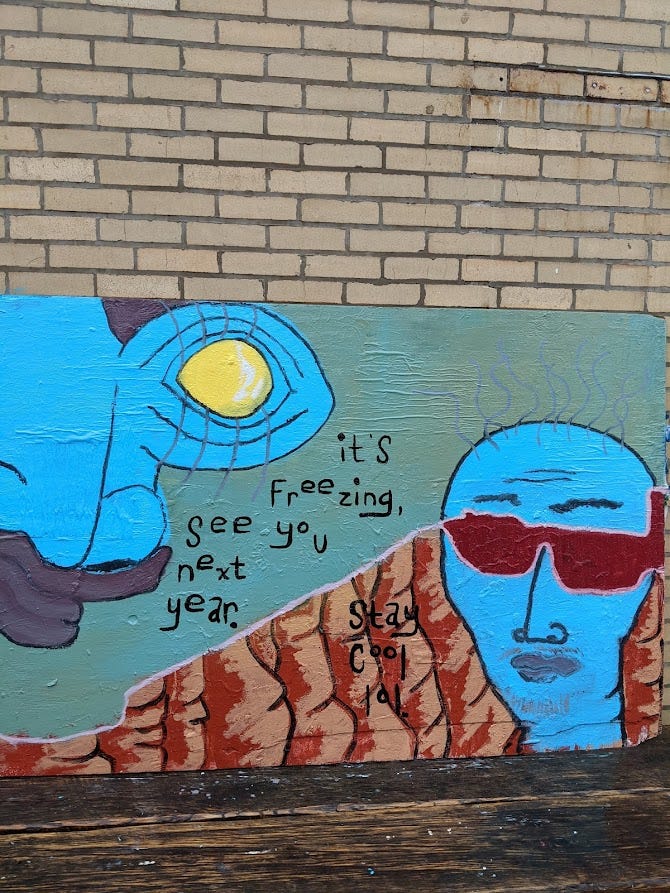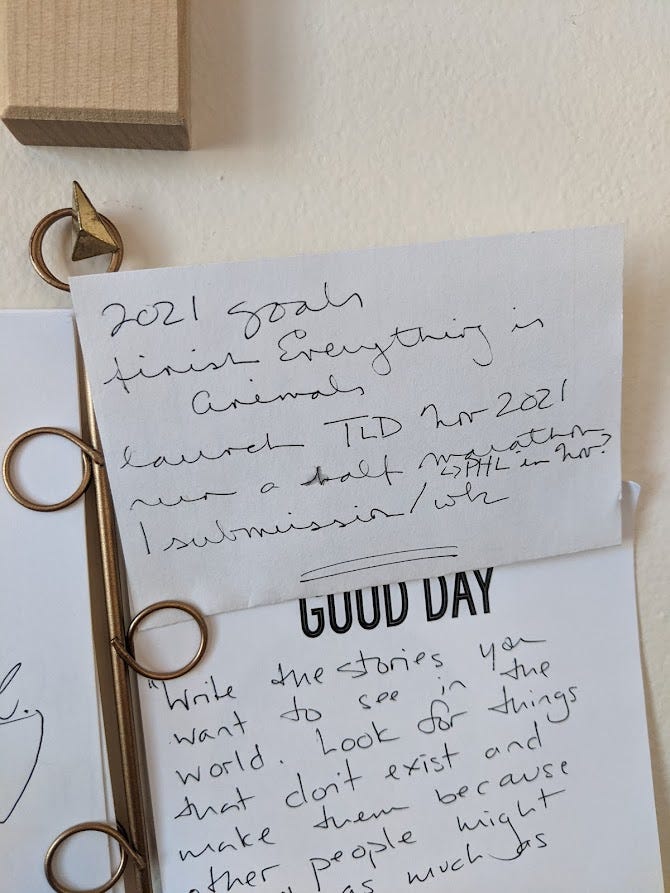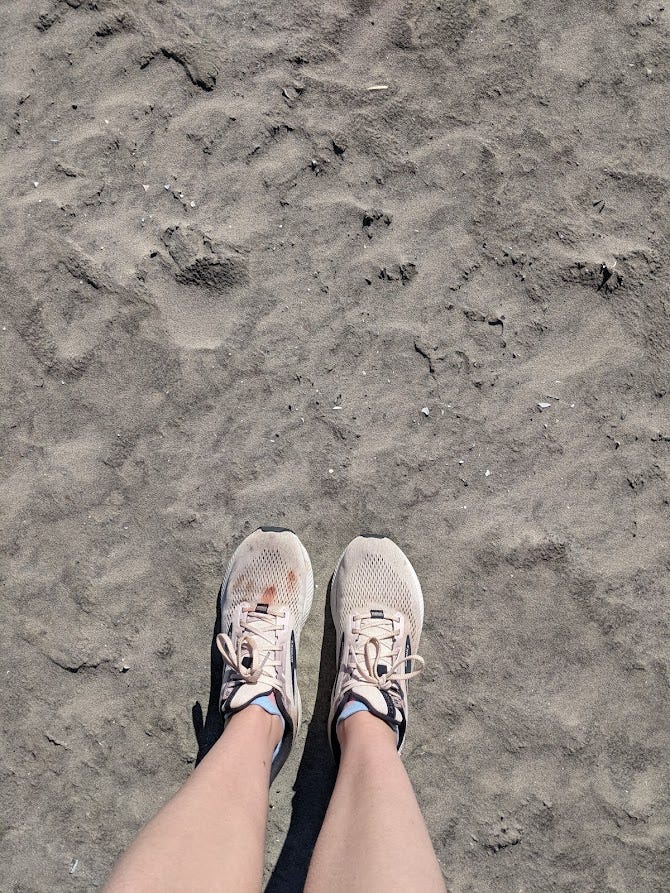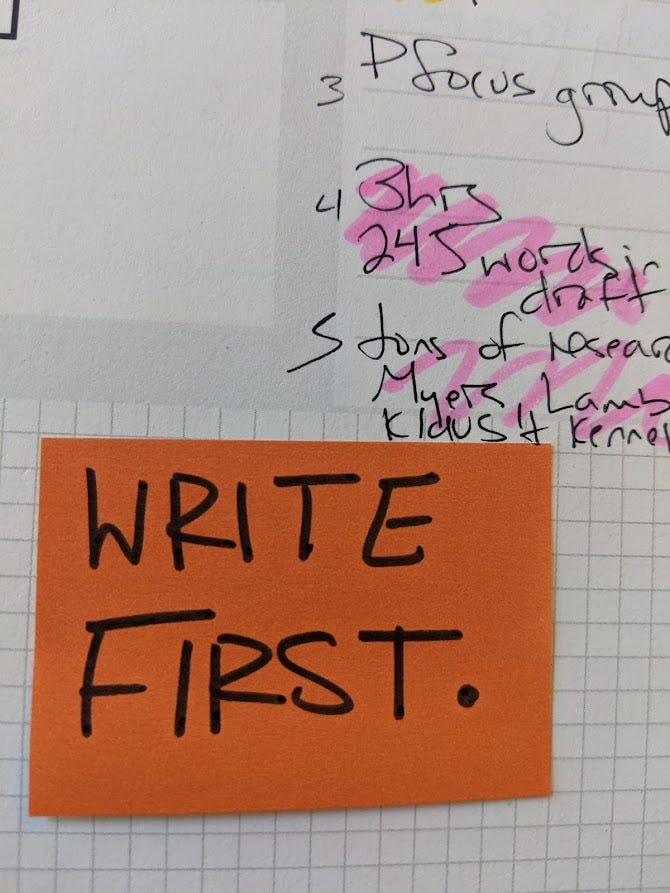don't call it a resolution
how thinking about what and how and why can help you achieve your writing goals in 2022
One of the problems with resolutions is that they’re often about doing more—drinking more water, getting more exercise, waking up earlier, writing more, reading more books. And I don’t know about you, but heading into year 3 of the pandemic, I don’t have any more in me. What I’m working on this year is doing less, and doing it more strategically.

At the beginning of 2021, full of vim and vigor and the certainty that the end of the pandemic was on the horizon, I breezily jotted down four targets for the year and posted them at my desk:

I’ve been thinking about which of those four goals I met and why and how that reflection might inform my work in this new year. I can say I definitively met two of those goals—run a half marathon and submit one thing a week—and, most obviously, it’s because they’re very straightforwardly measurable. I was really generous in my counting of one thing a week—I counted big things like sending the final manuscript of Pocket Universe, my new book, to my editor at LSU at the beginning of the year and doing copyedits on The Long Devotion (huge thank you to my co-editor Emily who has an attention to detail I can’t begin to match!), and I also counted smaller things like sending out this newsletter, pitching essays, submitting poems. The idea behind that goal was just to get stuff out into the world more, and one thing a week set a consistent pace that I mostly kept up.
But here’s the deeper lesson that I think we can use to work more deliberately in 2022: we can work best toward our targets when those goals have a WHAT, a HOW, and a WHY. The half marathon was a WHAT goal—a very clearly defined thing I was working to accomplish. And the submissions were a HOW—sending at least one thing out a week as a means of getting more writing out into the world. HOW goals have gotten a lot of traction in the writing world in recent years, especially since Kim Liao’s great Lit Hub article about aiming for 100 rejections a year. The idea there is that you can’t control the outcome, but you can control the process; there’s no guarantee that anything you write will be accepted for publication anywhere, but sending things out a ton raises those odds. (Here, submissions are what business types call a lead measure—the effort you put into something; lag measures are the results.)
This is all well and good, but focusing just on the HOW, on your lead measures, can make you feel at times a bit rudderless. It’s easy to get rejected from things—but are you submitting to things that will take you where you want to go?
So what I’m working on this year is the alignment of those things—defining WHAT goals (specific outcomes) that I’ll work toward with a regular HOW goal.
a few examples of connecting the WHAT AND HOW of your goals for your writing life:
If you want to establish a regular writing practice (WHAT), you could make a goal of writing at least a little bit every day for 30 days (HOW).
If you want to publish 5 essays or 10 poems (WHAT), you might aim to identify 10-20 drafts or ideas and plan to spend at least 5 hours a week on revising them (HOW) before submitting each one to at least 5 places (HOW, part 2).
If you want to finish a book this year (WHAT), you can aim to work on it every day (HOW), join a writing group (HOW), sign up for a class (HOW), and/or track your word count (I think Pacemaker is great).
The idea here is to both articulate where you want to go with your writing this year—and think about the specific, regular steps you can take to get there.
two quick thoughts about what and how
Again, I think the early January energy of resolutions and fresh starts can lead us sometimes to just frantically doing more. One thing to consider is which goals matter the most to you—and what you’re going to not do so that you can move deliberately toward those goals. You might even write them down! For example, I don’t garden or have a particularly well-decorated house. I’m probably not going to try many new recipes or volunteer for anything at my kids’ school. (Sorry!) This year, I’m really focused on getting my two new books out into the world and doing the world that will help me publish the nonfiction book I’ve been working on. That means lots of things have to drop away.
I also think it’s really important to define why you’re working on the goals you’ve identified. With my goals from last year, I had a why in the back of my mind, but pulling it out more explicitly is important for motivation and sustained effort. I wanted to run a half marathon because long distances (I know! it’s not a full marathon! I’m not an ultrarunner! a half is plenty for me) make me feel strong, and I like knowing that I’m stubborn enough to power through. And I wanted to submit writing regularly because finishing work is sometimes hard for me, and having that target would force me to follow through. This article from The New York Times over the summer has some really helpful insights about motivation and the importance of connecting to your why:
when you connect the things that are important to you to the things you need to do — even the drudgeries — you can feel more in control of your actions. What do you love about your work? What core value does it meet?
So as you write down your goals for this year, I think it’s helpful to really spell out the WHAT, HOW, and WHY.
or maybe not
If all this talk of targets and process and focused productivity makes you want to lay on the floor and cry, you could also just take a break. Two alternate approaches:
If you’ve decided that Resolutions are not the Vibe for 2022, you could follow the lead of Faith Hill, who makes the case that we should focus on small good things rather than specific goals:
See, the problem isn’t just with how we define or pursue our goals; it’s with the very idea of prioritizing tangible outcomes. Assessing our personal progress in terms of resolutions leads us to aspire to things that we can cross off a list, and that shapes our behavior in turn. “We often measure things that are easy to measure,” Ordóñez told me. “Not what we really want to do.”
You could also just say, as Laura Portwood-Stacer says, Forget Goals and focus instead on first steps that will move you in the direction you want to go:
Goals are good things to have and maybe we’ll talk about goals later this year sometime. But for now, f*ck goals. As we start 2021, let’s think about something other than goals. Let’s think about steps. In fact, let’s just think about first steps. First steps feel more manageable than goals at the moment.
If doing everything is too much, just do one small thing:
Your small thing might be a particular scene you’ve been wanting to write. It could be to flip through an old notebook and collect lines and images for new writing. You could read the poems you’ve written recently and write yourself a list of assignments for new work. If there’s a place you’ve been feeling stuck, make your work in that place smaller.
a few of my favorite things
Tamara J. Madison (a friend of the newsletter! hi, Tamara!) is leading a free workshop for SAFTA this Wednesday from 6-7.30 PM eastern that looks great—Conjure: Family & Folklore as Inspiration for Creative Writing:
This workshop will inspire writers (poets, fiction, and non-fiction writers) to use family photos, archives, histories, and even folklore as endless inspiration for new work. Using a series of images, writers will be challenged to examine photographs and explore the characters, landscape, and environment of these photographs to dabble in persona writing which may creatively record family, community, cultural history/events and “conjure” new visions. The emphasis of the workshop is brainstorming and exploring through writing prompts and exercises to discover possibilities of further writing and development.
You can read more about Tamara and sign up at this link.
I did Dan Blank’s Creative Clarity exercise this past week and found it really helpful in terms of thinking about priorities for the year. You can read more about his process and see lots of examples in the recording. (Dan works with writers on what he calls “human-centered marketing” and writes a smart and encouraging weekly newsletter, if that sounds like something that would help you.)
And, finally, a little bit of wisdom from Jami Attenberg, whose memoir, I Came All This Way to Meet You, is out tomorrow:
What I have learned: No matter what I’m writing, it’s never a waste of time. I’m always working through something. I’m always trying to arrive at a new location. Even I can’t see it right away, it’s happening beneath the surface. I don’t know how else to say it but this: If you want to be a writer, just sit down and write already. That’s the only way to get things done.
How is your writing going? What are you hoping for this year? Do you have a what, how, and why in mind? I’d love to hear from you. You can always reply to this email, comment below, or find me on twitter (@nancy_reddy) and instagram (@nancy.o.reddy).





